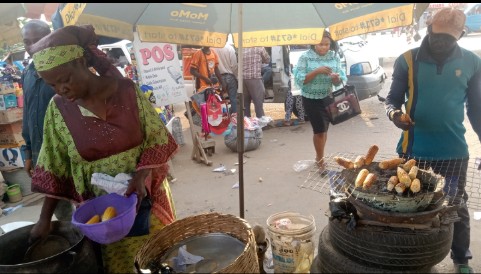At 46 years old, Oyindamola Adebayo has cultivated a thriving business roasting and selling corn over the past two decades.
What began as a humble venture has blossomed into a cornerstone of her life, enabling her to fulfill her roles as both a nurturing mother and a homeowner.
Through her dedication and hard work, she has not only provided her children with quality education but also secured a place they can call home joining hands with her husband.
“With the corn business and with the support of my husband, I have built a house and educated my children,” she joyfully said, illustrating the profound impact of her trade.
“If there’s no maize, I’ll roast plantain,” she told Harbinger, emphasizing her resilience and determination to succeed no matter the circumstances. This flexibility has been key to her ability to navigate the ever-changing economic landscape, ensuring stability for her family despite external pressures.
Inflation Squeezes Margins for Small-Scale Corn Traders
The corn industry in Nigeria is a vital component of the agricultural sector, providing livelihoods for countless families.
Corn, or maize, is not only a staple food but also a critical source of income for many rural communities. Over the years, farmers and traders like Oyindamola, Dupe, and Bamidele have built their lives around this crop, contributing to local economies and food security.
However, recent economic shifts have posed significant challenges. The removal of fuel subsidies in Nigeria, aimed at reducing government expenditure, has led to increased transportation and production costs.
This has directly impacted small-scale traders who rely heavily on affordable logistics to maintain profitability. As a result, the prices of essential goods, including corn, have skyrocketed, affecting both sellers and consumers.
Fertilizer costs have also surged, doubling in some regions, according to agricultural reports. This increase has placed a heavy burden on farmers, leading to higher prices for corn and other crops. The impact trickles down to traders like Bamidele, who struggle to maintain competitive pricing while covering rising expenses.
In 2023, the price of corn was approximately #1,000 per bulk purchase.
By 2024, this price had risen to #1,500, a substantial increase that reflects broader inflationary trends in the economy. This shift has forced traders to make difficult decisions, often reducing their profit margins or passing costs onto consumers.
Sustaining Families’ Dreams
However, Dupe Omotere, who has been in the corn business for over 20 years, has successfully supported her family.
With her husband’s support, she has provided education for her children, one of whom attends the Polytechnic of Ede. “From this business, I’ve catered for my children,” she shares, emphasizing the vital role of her trade.
Bamidele Balikis, with a decade into the business, combines corn with ponmo and vegetables. Her dedication has enabled her to send her children to university and purchase land, a step toward a more secure future. Though they haven’t built a house yet, the land symbolizes hope and progress.
Mounting Challenges
Despite these achievements, rising costs now threaten their livelihoods. Oyindamola notes, “Things have changed…buying in bulk at #1,500 now instead of #1,000.” This increase, coupled with expenses for charcoal and paper, reduces her profits significantly.
Dupe’s situation echoes these concerns. Once able to manage with #1,000 in the market, she now finds that even #30,000 is insufficient. The removal of fuel subsidies has exacerbated inflation, making essentials increasingly unaffordable.
Bamidele grapples with soaring prices as well. “Vegetables are very expensive at the moment,” she remarks, facing mounting debts due to high costs. Pomo, previously affordable, now costs up to #50,000 before processing, further straining her finances.
Economist Urges Government to Support Small-Scale Vendors
Kehinde Adeyemi, a well-regarded economist, explored the extensive impact of rising inflation on small-scale food vendors, noting how it affects both individuals and the broader business community.
“In broad terms, inflation touches everyone, but small businesses feel it acutely,” Adeyemi remarked, pointing out the pervasive nature of this economic issue.
He believes that government intervention is crucial, particularly in facilitating better access to credit for small entrepreneurs. “To support small businesses, the government should simplify and reduce the cost of accessing credit,” he advised.
Adeyemi argued that such financial measures are essential for revitalizing struggling enterprises, providing them with much-needed support during turbulent times.
He also highlighted the necessity of palliative measures during economic difficulties, stating, “With global inflation, it’s vital for governments to introduce measures to mitigate the impact on citizens.” He suggested targeted cash transfers and streamlined funding options as effective ways to stabilize businesses and encourage consumer spending.




